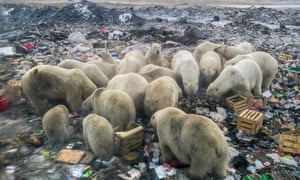Instead of “climate change” the preferred terms are “climate emergency, crisis or breakdown” and “global heating” is favoured over “global warming”, although the original terms are not banned.
“We want to ensure that we are being scientifically precise, while also communicating clearly with readers on this very important issue,” said the editor-in-chief, Katharine Viner. “The phrase ‘climate change’, for example, sounds rather passive and gentle when what scientists are talking about is a catastrophe for humanity.”
“Increasingly, climate scientists and organisations from the UN to the Met Office are changing their terminology, and using stronger language to describe the situation we’re in,” she said.

The destruction of Arctic ecosystems forces animals to search for food on land, such as these polar bears in northern Russia. Photograph: Alexander Grir/AFP/Getty Images
Continue reading at: Why the Guardian is changing the language it uses about the environment | Environment | The Guardian



